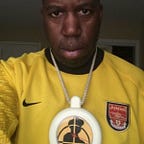Why Barely Anyone Listens to Pre-Recorded Rap
People lament about the old days…but they ain’t talking about pre-79
When I got into Hip-Hop that summer of 1984, I jumped in with the same passion and vigor that I tackled football years earlier.
Of course, it was much easier with football. I could read about the origins of football in the encyclopedias that we had at home. I played and watched football. When the book mobile came via the R.I.F. Program, there was no shortage of books on football.
But Hip-Hop….
There were no books, barely any magazines articles, practically no scholarship on the culture that I had adopted. We wrote about the emergence of books and more specifically magazines here so we won’t go into that.
Sadly, no book or magazine could solve one of the biggest problems a Hip-Hop archivist faced. We could read about these parties, the park jams, etc but we still didn’t know what they SOUNDED like.
There was no internet and most people weren’t walking around with bootlegs from park jams or high schools or PALs.
When I was gifted my first non-album, old school Hip-Hop tape, the much vaunted Cold Crush vs Fantastic Romantic battle at Harlem world, I foolishly believed that everyone would want to hear it. At the very least, I thought it would start conversation.
My next shift at Soul Source, the bookstore across the street from the shared AUC library, I threw it on and waited for the shocked responses of my fellow students who loved my mixes that featured samples from many of our favorite rap songs.
I got into work. Excitedly popped that tape in, and stood victoriously behind the counter, proud of being in the know.
No one made a peep about it. Some people were even annoyed by the inherent bootleg hiss. I never tried again. Not at campus at least.
When I graduated and moved to New York, if I met a self-proclaimed Hip-Hop head, I tested out the Cold Crush battle on them or Grandmaster Flash at Bronx River or Masterdon and the Def Committee at Harlem World* . More times than not, they wanted me to turn it off.
I couldn’t understand it. Here were people who professed their love for Hip-Hop, said they loved “the culture” but had absolutely no appreciation for the jams that were the foundation for everything they loved.
Why?
The answer is simple, actually. The music that is the foundation of rap music, the jams that are the root of this $10 Billion+ industry was never intended for passive listening, the sole purpose of the music was to make the dancers move.
I’ve often read and heard people like Russell Simmons and Marley Marl talk about how recorded rap lacked the spirit and excitement that they experienced at a jam. They longed for the echoes, the energy, the rush they felt when they fell in love with the music.
That disappointment is what drove them to move beyond backing band, electro, and even the stripped down rap all in the spirit of chasing that first high.
The music that they made, the Cold Chillin’/Def Jam music is the music that most people are talking about when they say they love Hip-Hop. The music that grew out of that era is the music that many people wish would return.
So, ironically, in the producer’s attempts to recreate the feeling of the music that they fell in love with, they moved further away from it, making their inspiration almost unbearable for the modern listener.
The original Hip-Hop music was participatory, with rap just a component, all with the intention of inspiring the dancer, the shouting out of people’s names, the call and response— very African, innit?
But that music like DC’s equivalent, Go-Go ain’t made for the buy a track at a time society. In order to understand and appreciate it, either you have to mentally place yourself in that time period or, as the saying goes, “you just have to be there.”
*Fat Beats had a vast selection of “old school” tapes
